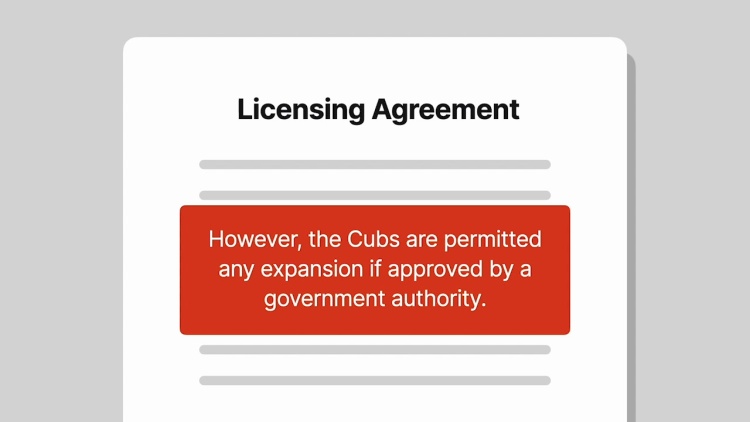Right Field Rooftops, LLC v. Chicago Baseball Holdings, LLC
United States District Court for the Northern District of Illinois
87 F. Supp. 3d 874 (2015)
- Written by Rose VanHofwegen, JD
Facts
Right Field Rooftops, LLC (Rooftops) (plaintiff) owns two buildings across the street from Wrigley Field. Historically, fans enjoyed views into the stadium from neighboring rooftops, and Rooftops sold tickets to view Chicago Cubs games and concerts. In 2002, the Cubs sued Rooftops, and the parties entered a licensing agreement requiring Rooftops to give the Cubs 17 percent of its profits. In exchange, the Cubs agreed not to put up barricades blocking Rooftops’s views. However, the agreement explicitly allowed “any expansion” of Wrigley approved by a “governmental authority.” The relevant section was titled “Wrigley Field bleacher expansion,” but addressed other types of expansion like erecting “windscreens or other barriers.” In 2004, Chicago designated Wrigley a historic landmark, limiting future alterations. In 2009, the Rickettses bought the Cubs, ballpark, and some but not all adjacent rooftop businesses. Soon afterward the Cubs lobbied to renovate Wrigley by increasing bleacher seats and adding giant video boards and billboards that would block Rooftops’s views. After two years of hearings, the city and the landmarks commission approved the plans. Rooftops sued Cubs owners Chicago Cubs Baseball Club LLC, Wrigley Field Holdings, LLC, Chicago Baseball Holdings, LLC, and Thomas Ricketts (defendants) for a temporary restraining order (TRO) and injunction to prevent installation of a jumbotron and other signage. Rooftops argued that the Cubs had a contractual duty under the licensing agreement not to install video boards blocking its views. The court denied the TRO, reasoning the claimants had not shown a strong likelihood of success on the merits, before addressing the request for preliminary injunction.
Rule of Law
Issue
Holding and Reasoning (Kendall, J.)
What to do next…
Here's why 911,000 law students have relied on our case briefs:
- Written by law professors and practitioners, not other law students. 47,100 briefs, keyed to 997 casebooks. Top-notch customer support.
- The right amount of information, includes the facts, issues, rule of law, holding and reasoning, and any concurrences and dissents.
- Access in your classes, works on your mobile and tablet. Massive library of related video lessons and high quality multiple-choice questions.
- Easy to use, uniform format for every case brief. Written in plain English, not in legalese. Our briefs summarize and simplify; they don’t just repeat the court’s language.





